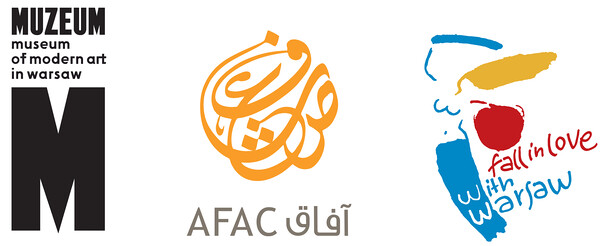June 8–December 31, 2018
ul. Pańska 3
00-124 Warsaw
Poland
Hours: Tuesday–Sunday 12–8pm
info@artmuseum.pl
The Museum of Modern Art in Warsaw and the Arab Fund for Arts and Culture (AFAC) are proud to announce Reem Al-Ghazzi as the first fellow in a grant for a Syrian filmmaker supported by the City of Warsaw and the Arab Fund for Arts and Culture, and operated by the Museum of Modern Art in Warsaw. The mission of the residency is to provide the institutional and creative framework for a filmmaker to develop her/his project, to benefit from the museum’s network of affiliations with other institutions, and to access archives and experts to enrich her/his film project.
The filmmaker Reem Al-Ghazzi will spend seven months in Warsaw working alongside Polish film professionals and experts on the postproduction of her film Iphigenia (working title). This work will include a series of merit-based consultations, focused on the narrative structure of the film as well as its technical aspects.
Iphigenia is a feature-length creative documentary. The film follows the story of nine young Syrian women who have fled to Germany to escape the war and, for some, to escape the society at home. They hail from different walks of life and from differing communities in Syria, and were brought together on stage at the Volksbühne in Berlin for roles in a modern adaptation of Euripides’ Iphigenia written by playwright Mohammad al-Attar and directed by Omar Abusaada. Reem Al-Ghazzi had close access to the cast of non-professional actresses. She filmed the preparations, rehearsals, discussions and the premiere, but also the women’s lives in Germany, outside the theatre. As the women spent more and more time together, they discovered that though they had left to escape pain and possible death, they actually carried these wherever they went. Could they escape the past, family, society and themselves?
Reem Al-Ghazzi is a documentary filmmaker based in Damascus. She has directed and produced several short documentaries individually and as part of collectives. Her films have received awards at the Casablanca International Film Festival and the Alexandria Film Festival, and have been screened at the Cinéma du réel in Paris and the Locarno International Film Festival. Al-Ghazzi has also established a series of documentary workshops in Syria, and has been running them across the country for almost a decade. Iphigenia is her debut feature, produced by Ramzy Haddad and Rosie Garthwaite.
The residency is supervised by Łukasz Ronduda (film curator), Magda Lipska (curator and researcher) and Katarzyna Karwańska (production supervisor). The external curator providing content-related support for the project is Rasha Salti, curator of Arab cinema.
Since 2010, the Museum of Modern Art in Warsaw has run a series of film-related projects. Filmoteka Muzeum is a project of digitizing and presenting outstanding films created by Polish visual artists in the 20th century and at the beginning of the 21st century, and the Film Award, organised alongside the Polish Film Institute, is for the production of a feature film by a visual artist. The Film Award aims to promote experimental artistic cinema that breaks radically with conventional ways of constructing the film form, and the festival KinoMuzeum concentrates on presenting crucial phenomena in film from various distribution circuits.
The Arab Fund for Arts and Culture was established in 2007 by cultural lobbyists as an independent initiative to fund individuals and organizations in the fields of cinema, the performing arts, literature, music and visual arts, while facilitating cultural exchange, research and cooperation across the Arabic world and globally. Since its inception, AFAC has gained recognition internationally and regionally, working with a range of reputable institutional partners, issuing around 1,300 grants to date, with about 150 new grants per year. AFAC is registered in Switzerland with headquarters in Beirut, Lebanon.


